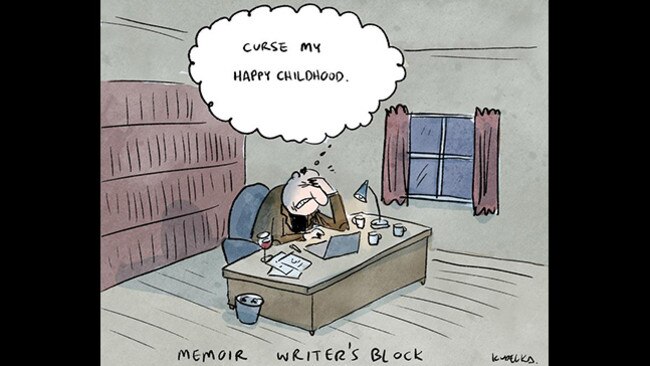Richard Glover’s memoir Flesh Wounds a wonderful read
ABC broadcaster and newspaper columnist Richard Glover brilliantly records his quest to understand his parents.

For reasons you might guess, I have spent a lot of time lately reading memoirs. Along with travel writing and biography, they are the literary genre I find most often rewarding. There are great new novels that I enjoy, but I don’t feel confident that I will enjoy a new novel even if it’s been well reviewed.
Too many of them are full of experimentation for its own sake, which is distracting at best, or endless authorial voice tricks, or knowing literary references, or the modern cult of pornographic violence. I need a special recommendation to take one on.
Memoirs and travel writing, by contrast, offer story, plot, character, incident, development, and even resolution. Travel writing is a bit like light comedy, though, often good, but by its nature rarely great.
But memoirs confront no limitations of form. Only a few Australian political memoirs are a delight. John Button and Paul Hasluck are the standouts, and Bob Carr’s Diary of a Foreign Minister. But our literary memoirs have been superb, from Hal Porter to Donald Horne to Clive James. I realise that two of these — James and Horne — are journalists.
Now there is a new classic. Richard Glover’s Flesh Wounds is a minor masterpiece, and I use the word minor only because I am a bit shy of making too big a claim.
Glover is an ABC radio personality. He writes a weekly column in the Fairfax press and most of his previous books have been overtly funny and based on the comedy of families. He is very good at radio because he is well informed and good humoured, and he has an easy, unaffected air that puts his interlocutors at ease.
His family columns have their following and they too are light and easy. But I feel that all this gracious, good-humoured stuff from Glover will lead people to miss how very fine Flesh Wounds really is. It centres on Glover’s lifelong quest to understand his two deeply eccentric parents.
His mother is a great beauty with working-class English origins who fakes an upper-class identity. She cannot relate much to her son, or her husband, whom she leaves to run off with Richard’s English teacher. With him she establishes a Tolkien-themed menagerie, featuring teddy bears and nudism, just a couple of steps short of a kind of madness.
Richard’s dad declines into broken marriages and alcoholism. Neither parent ever takes much notice of their son. But this is not remotely a story of self-pity.
It is in fact a breathtaking accomplishment in style and empathy. In the end, though you cannot quite believe that Glover emerges from all this as apparently unscathed as he does, you end up with more than a glimmer of understanding, and even some unexpected sympathy, for his parents. This is because Glover so brilliantly conveys his own attitude, which is one of loving bewilderment, an attitude redeemed and repaid when he meets his wife, Debra.
The style and pace remind me of the apparent casualness of a Willa Cather novel, where some of the action takes place off stage, there is a good deal of authorial chatter, much that seems trivial is related. But all this builds, with the reader barely aware of what is happening, a powerful intimacy with the main character, which, finally, is profoundly engaging.
If I have a quibble with anything it is perhaps that the jokiness and conversational directness is marginally overdone in the early passages. But this is a very small quibble. And it could be that Glover is hedging here against some quite shocking revelations of predatory sexual behaviour by characters outside the family.
Glover is a great fan of PG Wodehouse and this is a good influence on any writer. He also has a fine sense of self-parody, and of the way a sentence can take unexpected directions. Consider: “I was bookish and effete and found a peer group of other would-be intellectuals. We were pretentious and ridiculous, of course, competing with each other as to who would be the first to claim they’d read Camus or Sartre. All I actually read, of course, was my own body weight in PG Wodehouse and Dorothy L. Sayers.”
That’s a great sentence, in what is an astonishingly good book.



To join the conversation, please log in. Don't have an account? Register
Join the conversation, you are commenting as Logout